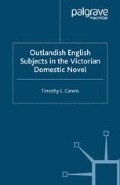Abstract
Wilkie Collins wrote The Moonstone (1868) during a period in which few Victorians questioned the legitimacy or necessity of imperial rule in India. It was widely believed that Indians were instinctual, impulsive, and fanatic, that they lacked the mechanisms of self-control that guaranteed sound government at the level of self and society alike.1 The 1857 rebellion known in England as the Mutiny seemed to confirm the passionate volatility of Indians and their general antipathy to law and order. In the wake of the rebellion, a steady stream of journalistic accounts, full-scale histories, and eye-witness narratives began to appear in England. Although these “Mutiny” texts offer varied perspectives and explanations, most confirm conventional notions about the mutinous nature of Indian subjectivity. In his novel, Collins does not dispute prevailing understandings of “the Indian character,” but he does question the extent to which “the English character” differs from its ungovernable colonial counterpart. He does so by appropriating ethnographic commonplaces about Indian subjectivity and society and projecting them onto the English domestic scene. The characters in his novel are overmastered by their own “dark” and irrational obsessions, inordinate desires, unruly aggressions, and fanatical idolatries. This irony subverts accepted oppositions between those who inhabit mutinous India, which Betteredge dismisses as one of the “outlandish places of the earth,” and those who inhabit the presumably quiet and reasonable domestic nation (82).
Access this chapter
Tax calculation will be finalised at checkout
Purchases are for personal use only
Preview
Unable to display preview. Download preview PDF.
Notes
Two additional psychosexual readings of the novel: Lewis A. Lawson, “Wilkie Collins and The Moonstone” (1963) and Charles Rycroft, “Detective Story: Psychoanalytic Observations,” The Psychoanalytic Quarterly (1957). Feminist accounts which interpret Blake’s sexual “conquest” as broadly indicative of Rachel’s subordination to patriarchal power have developed the standard psychosexual interpretation. Tamar Heller (1992) argues, for example, that the diamond “signifies not merely [Rachel’s] virginity but what Bruff calls her ‘self-dependence’ as well” (146).
Wilkie Collins, No Name (1862: 641); The Evil Genius (1886: 264).
Author information
Authors and Affiliations
Copyright information
© 2005 Timothy L. Carens
About this chapter
Cite this chapter
Carens, T.L. (2005). Mutinous Outbreaks in The Moonstone. In: Outlandish English Subjects in the Victorian Domestic Novel. Palgrave Macmillan, London. https://doi.org/10.1057/9780230501614_5
Download citation
DOI: https://doi.org/10.1057/9780230501614_5
Publisher Name: Palgrave Macmillan, London
Print ISBN: 978-1-349-52363-4
Online ISBN: 978-0-230-50161-4
eBook Packages: Palgrave Literature & Performing Arts CollectionLiterature, Cultural and Media Studies (R0)

